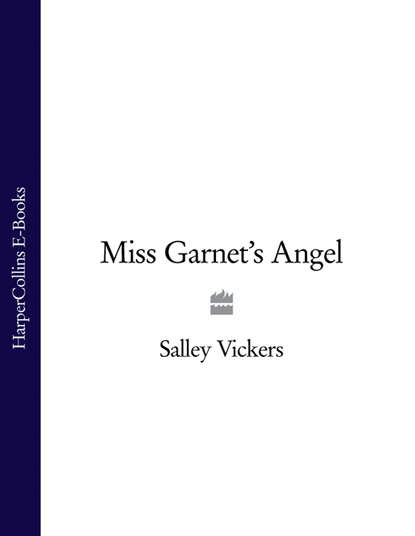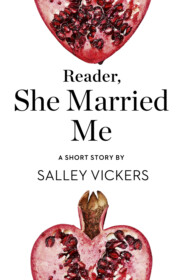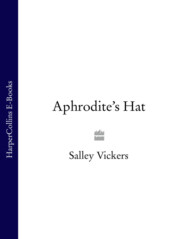По всем вопросам обращайтесь на: info@litportal.ru
(©) 2003-2024.
✖
Miss Garnet’s Angel
Автор
Год написания книги
2019
Настройки чтения
Размер шрифта
Высота строк
Поля
‘Look! See!’ The blue-clad person pointed at a yellow sign indicating falling stones hanging on the scaffolding which Julia Garnet had failed to take in. ‘If you get hurt there’s hell to pay. We’re working here.’ The person pulled down the goggles to reveal indignant pale blue eyes.
‘I’m sorry.’ Though in truth she wasn’t. ‘I didn’t see the notice.’
‘What’s the trouble?’ A second voice, lighter than the first. A figure also wearing goggles swung down. Pulling off an almost identical hat and pushing down the goggles it revealed itself as a fair-haired young woman. ‘What’s up, Tobes?’
‘I fear I am trespassing.’ Julia spoke coldly.
‘Don’t worry,’ the girl spoke soothingly. ‘He was just worried we might drop something on your head. We were breaking for lunch anyway. I’m Sarah, by the way. This is Toby.’ She gestured at the other figure and then as Julia Garnet made no remark, ‘We work together.’
The tone was propitiating and Julia unbent. ‘It was silly of me. I didn’t think.’ Really she wanted to scuttle away from the aggressive young man but the girl seemed pleasant enough. She struggled to find an answering politeness. ‘What is your work?’ She found, as she asked the question, she indeed wished to know.
‘We’re restorers. This is one of the English restorations.’
‘And do you work always together?’ How exhilarating it might be to work high up. One could look out over the city, like a bird–or an angel.
‘We’re twins,’ said the girl as if in explanation and indeed her eyes were the self-same pale blue as her brother’s.
Julia Garnet had taught twins and the experience had not been comfortable. For the whole of one fraught year the Stevens twins had reduced a class to chaos by answering in unison when either was asked a question or (worse) singing in a peculiar toneless syncopation when neither was. There was a brazenness and self-sufficiency about twins which challenged her composure. Instinctively, she made as if to depart.
‘Would you like to see round?’ Again it was the girl who spoke while her brother only watched silently. His lashes, Miss Garnet noticed, were long and fair.
‘How kind of you but I must–’
‘If you want, you can come up on the platform and see Himself.’ It was the young man speaking and he had also pulled off his woolly hat to reveal long blond locks and an earring.
‘Himself?’ Julia Garnet found her face was reddening. How provoking that she should blush so easily before these young people.
But the young man, who appeared to have forgotten his former discontent, was not looking at her face but was extending a gloved hand. ‘Here, it’s quite safe.’ And to her own surprise Julia Garnet found herself being gripped by the elbow and swung up and onto a wooden-planked platform along the building’s side. ‘Look,’ said the young man, and then as if by way of introduction, ‘the Angel Raphael.’
Surrounded by scaffolding a serene face cut into stone smiled out at her. Whatever did one do when faced with the smile of an angel?
‘He’s great, isn’t he?’ The young man spoke with enthusiasm; his earlier antagonism had apparently melted away.
Reassured, Julia Garnet asked, ‘How do you know he’s a he?’
‘It’s a convention.’ It was the young woman, Sarah she had called herself, who had swung her own way up and had now joined them on the platform. ‘They’re sexless, angels. Look, see the face is quite androgynous.’ And inwardly Julia Garnet observed that the young woman herself, and her brother, were, like the angels, also somewhat androgynous in their appearance.
It was a strange encounter, she thought a little later, as she left the twins eating ciabatta with tomatoes and the elongated rubinous onions she had seen on the street market stalls. Their legs had dangled over the edge of the platform. But a feeling like the warmth of Nicco’s cousin’s brandy crept through her: she was pleased with herself. She had made another acquaintance.
‘Two, really,’ she said that evening. ‘Though somehow one thinks of twins as one.’
Carlo and she were eating near the Arsenale. Julia’s previous diet had consisted of the plainest fare. On the rare occasions they had entertained, Harriet had cooked a chicken using a spoonful of dry sherry in the gravy. After Harriet’s death Julia had shopped at Marks and Spencer–dinners for one, compartmented as to meat or vegetables and encased in cardboard and foil. The experience of coming to Venice had not only opened her eyes–it had challenged her appetite. She was learning to enjoy food–especially with Carlo.
‘And they are restorers? I must go and look.’ A jug of prosecco was smacked down on the table. ‘Some prosecco? They serve it quite flat here without the sparkle, but very refreshing.’
Later, after they had eaten tiny clams and slabs of polenta cooked in sage and garlic, she asked, ‘It’s a chapel they are restoring?’
Carlo had taken a silver toothpick from his wallet. Watching him Julia thought, How funny that I am not revolted!
As if he had read her thoughts Carlo put the toothpick away. ‘Yes. It was known as the Chapel-of-the-Plague because it was built for a child–though others say it was for a mistress–dying of the plague.’
‘Is that why the angel is there?’ She remembered from the leaflet in the church his name in Hebrew meant ‘God’s healing’.
‘I guess so–he is around Venice.’
‘I like him.’ How odd that she was already so sure of this.
‘Oh, yes–he is nicer, with the smile, than the fierce Michael or the virtuous Gabriel!’ He pulled a long face, then laughed. Julia who could not quite rid herself of the belief that it was bad form to laugh at one’s own utterances, laughed too, a trifle uneasily. ‘But you know, they must be exceptional at their craft, your twins, to be employed on this project. It is unusual for the Soprintendenti to employ foreigners. I must visit–poke my nose in! Now, there are crayfish or there is lobster. Which shall we try?’
A few days later Julia Garnet, walking her habitual route down the Calle Lunga, remembered the short cut. She felt, in making a detour past the little brick edifice which bristled with scaffold poles, she was doing something slightly eccentric, if not intrusive, but in fact there was no sign of the twins.
That the twins were not there made Julia Garnet aware that she was disappointed. Without acknowledging it she had been looking forward to renewing acquaintance with the androgynous pair. There was something about the way they swung with easy confidence among the scaffolding (rather like the gibbons she had once seen in a tree at Whipsnade Zoo) which stirred her. And they had trounced her experience with the Stevens twins by being unexpectedly friendly–letting her up there to see the face of the Archangel. Perhaps, she thought, becoming fanciful, it was some form of ‘angelic’ communication that had prompted Toby’s suggestion? For it was he and not the more approachable girl who had made the offer which had led to her meeting with the smiling Raphael.
On the way home she passed two small girls taking something from a basket which hung suspended by a rope from an upper storey. ‘Grazie, Nana!’ the girls called, and looking up Julia Garnet saw the face of an elderly woman at an open window. The woman blew a kiss at the girls and, with elaborate pantomime, they returned the blessing.
The episode left Julia Garnet rather low. The elderlywoman had grandchildren–to whom she could send down sweets or pocket money in a basket–who loved her. Whatever other drawbacks age had brought the old Venetian lady, she had a family to be attached to–a reflection which contributed, back at the apartment, to a general feeling of being at a loose end. There were letters to write and books she had brought to read but these activities felt uninviting: it was company she wanted and she was grateful when Signora Mignelli called by with an enamel teapot.
‘For to make tea in!’ said the Signora, pointing at the teapot. ‘Sorry, I forget it.’
Julia herself had forgotten that she had ever felt the lack of such a thing. Signora Mignelli stayed and talked, resting her behind on the arm of the sofa. Her husband had had an operation for a ruptured hernia and dramatically the Signora enacted how he had been carried off in the ambulance boat in the dead of night to the hospital. She refused tea but stayed to recount a war between the fishmonger and the local priest. The fishmonger, Julia inferred, had a reputation for favouring other men’s wives and the priest had attempted to discuss the matter with him. ‘He is a Communist–so he not like,’ the Signora explained. ‘He say he go to another church.’
‘But if he is a Communist why is he going to church at all?’
‘Of course he go to church,’ the Signora said, dismissive at the suggestion of other possibilities.
Concerned lest she had affronted her landlady Julia diverted the conversation. ‘Do you know the Chapel-of-the-Plague?’
Signora Mignelli nodded approvingly. ‘Very old,’ she said, ‘and very holy. Much miracles there once. Now, no more.’ She shrugged. ‘It is the TV, I think.’
Nicco was not making much progress with his English. Carlo, who had called to tell her he had been as good as his word, and been by the chapel and spoken with the twins, narrowly missed one of the English lessons.
‘Do excuse me.’ Julia Garnet hastily cleared away a pile of books. One of them, The Tale of Jemima Puddle-duck, made her feel embarrassed: it betrayed the fact that she had bothered to bring it with her from England. She had not quite got over her tendency to become unnerved by Carlo’s presence and the children’s book added to the feeling of immaturity. ‘It’s the boy I give lessons to.’ She shoved Jemima Puddle-duck under a copy of Hello magazine donated by the Signora.
Carlo’s manners were exemplary. If he had spotted the story about the credulous duck and the predatory fox, which Julia had preserved since childhood, he gave no sign. He seemed to want to ask questions about Nicco but she was more interested in hearing what he had to say about the restoration.
‘So, I have met your friends.’
But this she felt she must correct. ‘Hardly friends!’
‘It is fascinating,’ ignoring her protests. ‘As always the problem is the salt. Venice has its feet for ever in water, you see, and they must refashion the floor. The boy is doing this, on his knees, while the girl is perched above him, working as stone mason. Modern youth, eh? They were most charming, I should say. They allowed me to look.’
‘Did they show you Himself?’ Julia felt slightly jealous. It had felt free up on the scaffolding.
‘Himself?’ Carlo looked puzzled.
‘The Archangel. Raphael.’ More than the humans she had met at the chapel, the angel seemed her friend.
‘Oh indeed. This is where the restoration must be most delicate. The girl is trained by a most marvellous man from your V & A who came over in ‘66 after the great floods. I know him a little. There is nothing to match you English with the chisel.’











